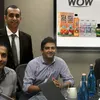Crafting success through the years - the story of Itsy Bitsy
Harish and Rashmi Closepet went from almost losing it all to building a Rs 70 crore business in sixteen years. Read on to know what made them tick through it all.
Candle making, calligraphy, decoupage, mixed media, engraving, wood crafting, soap-making and several such craft hobbies have people running to different retail stores in search of quality raw material.
In 2004, Itsy Bitsy was founded as a one stop shop for craft materials from manufacturer to retailers, making life easy for many craft lovers.
Before getting into the business, founders Harish Closepet and Rashmi Closepet, a husband and wife duo, lived in Australia for 10 years, working with discount retailers, and getting a first-hand experience of everything from supply chain to pricing.
"The idea came to me from my experience as a consultant, while in Singapore, in the early 90s. As part of our work, we guided the government of Karnataka in helping local artisans to export to a retail store in Singapore. Although that did not take off in scale, it did trigger the idea to start a company that can manufacture products for art, design and craft industries in India. But, it took my wife and me a good 12 years to become entrepreneurs. The idea was to manufacture and supply to global retailers hobby crafts and DIY products industry, and that's what we began in 2004," Harish says.
But soon they realised that entrepreneurship was not going to be plain sailing. Just after their manufacturing unit was set up in Bengaluru in 2004, they received their first order from a global retailer in Australia for Rs 50 lakhs.
The duo quickly produced items worth that amount and were awaiting the monies to be transferred before they exported the items. As the retailer promised the payment would be made soon, the company exported the order. However, the retailer went bankrupt and payment did not happen as promised. After many follow-ups, the retailer even stopped picking their calls, and in that moment, Harish and Rashmi were hit by the fact that all their savings were gone. Making up their minds to fold up, they began exploring job options when a silver lining came through from a retailer called Craftime in the UK.
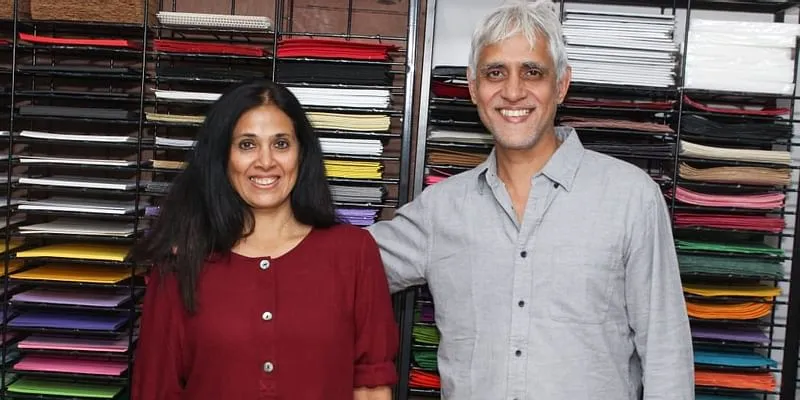
Itsy Bitsy founders Rashmi and Harish Closepet
"They wanted to source products from India and their official flew down to see our items and manufacturing plant. He studied our quality of work for a week and even gave us an advance to manufacture the items. This changed our fortunes and kickstarted our journey to make in India for the world," Rashmi says.
Fast forward sixteen years and Itsy Bitsy is India's largest art and craft manufacturing to retail to D2C stack in the country. The company has revenues of Rs 70 crore, as of FY2020, with 50 percent of it coming from exports. They also have 26 stores across the country and primarily in cities like Mumbai, Bangalore, Hyderabad, Chennai, Pune, Panjim, Ahmedabad, Mysore, Shimoga and Delhi.
They also supply to art and craft retailers like Hobby Lobby (USA), Hobby Craft (USA) and Lincraft (Australia).
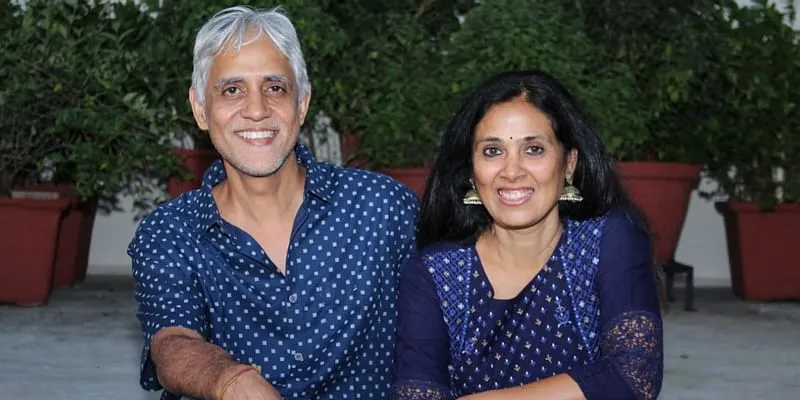
Harish and Rashmi bounce ideas off each other and execute them with razor sharp focus.
The business
YourStory visited Itsy Bity's factory, a Michael's - a large retailer in the USA - certified factory, in Kanakapura, a town situated 100 kilometres to the south west of Bengaluru and saw over 100 women working intensely at making intricate miniatures such as finger sized handmade paper flowers to wooden benches and unicorns. Each of these items are carefully packed to global standards and shipped. For Harish and Rashmi, following standards such as diversity hiring, quality assurance in manufacturing and supply chain are table stakes. They do not want to take anything for granted.
"We believe we are also a social organisation because we help rural communities. Ninety five percent of our workforce are women and our factories hire local talent. To support our stringent processes, we use modern SaaS tools that help us manage our SKU level data, our e-commerce data, our store data, and also our relationship with various vendors across the country," says Harish.
From the factory, YourStory then visited the 45000 square feet warehouse where corrugated boxes stood neatly arranged, ready to be shipped across all channels of sales. While one team keeps track of orders from Amazon and Flipkart, another looks at orders from its website. In total, the company has 10000 SKUs, which the duo believe is not at all complex because of the use of data to make decisions on what does or does not sell.
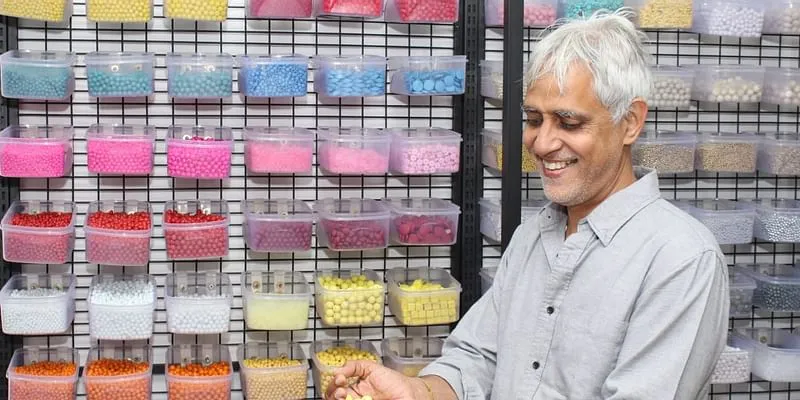
At an Itsy Bitsy craft store, Harish displays colourful beads.
The company employees over 1500 people directly, and a further 1500 persons indirectly thanks to their retail operations.
As the founders reminisce about the opening of their first retail store in Bengaluru in 2007, they say that much to their surprise, they witnessed kids flocking to the shop for all kinds of art and craft supplies as soon as the doors opened. Serving over 700,000 customers annually in India alone, until recently, Itsy Bitsy even had courses on hobby craft and art, which they had to stop when the pandemic hit.
"Ever since the pandemic, we have seen an uptick on our Instagram page as people like the art videos we post on our social media. What has also happened thanks to the pandemic is that we are able to renegotiate rentals and sign up properties for a lot less, say a quarter of the previous rental charges," Rashmi says.
The company will add 25 more stores over the next one year in cities like Coimbatore, Ernakulam, Indore, Kolkata, Srinagar and Vadodara.
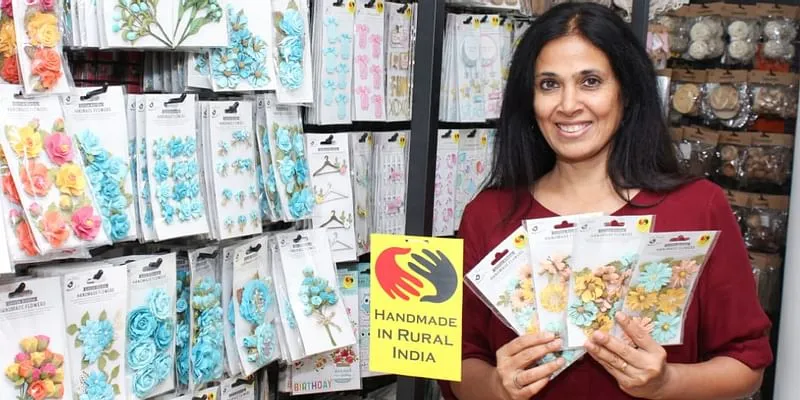
Rashmi Closepet with items made in rural India
It believes that there is no full stack service when it comes to art and craft and it is fulfilling the needs of a new generation who take their hobbies as seriously as their work lives. In their stores, customers are encouraged to touch and feel the products before buying. Amateur artistes flock the store for oils, paints and canvas.
"The market is so nascent in India that it provides us with an opportunity to scale towards becoming a big brand," Rashmi says.
In fact, a recent Avendus report believes that the D2C (e-commerce) sector will be a $100 billion opportunity in India for brands. There are 16 brands in India which are over $50 million in revenues annually. Some of the big names include boAt and Wow Skin Science. Also, according to BCG, retailing will be a $1 trillion market by 2025 and this will be led by the Indian youth.
"Our efforts will be to grow fast and while we do that we do not want to compromise on our ethos of social responsibility and enabling rural communities to serve the world," say the founders.
Harish and Rashmi are almost like friends who are able to bounce ideas off each other and execute them with razor sharp focus. "When you follow what you love to do then it always feels like day one," Rashmi remarks. No wonder then that a lot of their products have a personal touch.
In the next 18 months, the company plans to speed up its own e-commerce channel and will drive sales from its retail stores while it continues to manage orders from its eight factories and increase exports. The COVID-19 pandemic has slowed down exports for FY2021, but, the founders believe the market will pick up by FY2022.
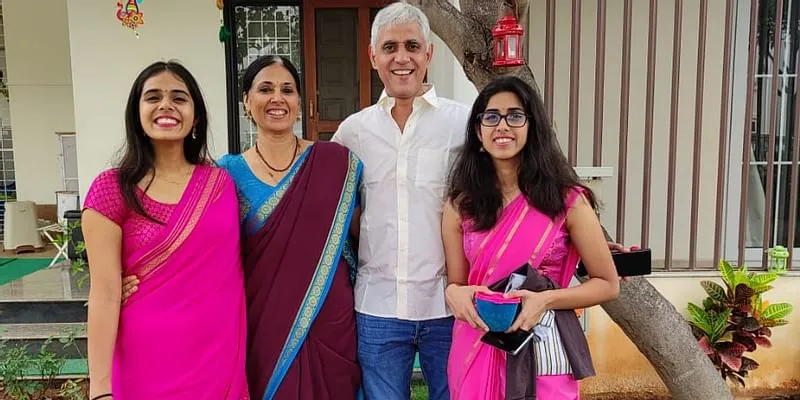
The founders with their daughters Vibha and Isha
Additionally, Harish and Rashmi are also starting a corporate employee engagement program called Craft Yoga under the Itsy Bitsy banner , which will be offered as an online craft workshop for employees during the pandemic, mainly as a stress buster. Craft Yoga will be launched in mid-December 2020. The company has already signed up a couple of IT Services companies as first customers.
The next time you are designing a greeting card or a decoupage, decorating the wall with stickers, or putting together intricate paper patters, just remember that these beautiful little decor items could be the product of an Indian brand called Itsy Bitsy.
Edited by Anju Narayanan



